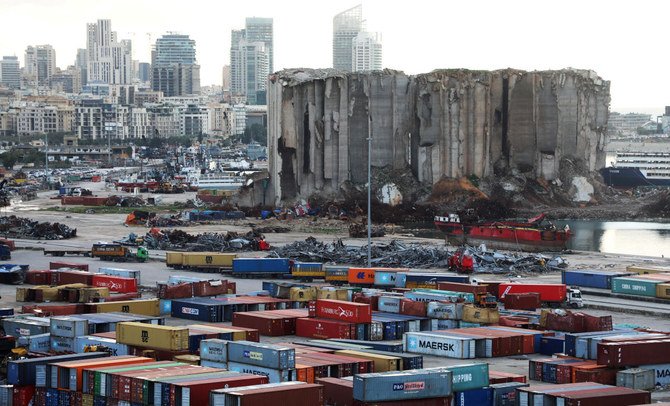BEIRUT: A section of the grain silos that absorbed much of last year’s Beirut port blast must be demolished to avoid collapse, experts warned in a report published Monday.
Swiss company Amann Engineering, which has offered laser scanning assistance to Lebanon since the cataclysmic August 4 explosion, called the most damaged of the disemboweled silos an “unstable, moving structure.”
“Our recommendation is to proceed with the deconstruction of this block,” the company said in a report.
“As it becomes more obvious the concrete piles have been heavily damaged… new silos will have to be built at a different location,” it warned.
Economy minister Raoul Nehme had said in November that Lebanon will demolish its largest grain store over public safety concerns, but authorities have yet to take action.
Once boasting a capacity of more than 100,000 tons, the imposing 48-meter-high structure has become emblematic of the catastrophic port blast that killed more than 200 people and damaged swathes of the capital.
Authorities say the blast was caused by a shipment of ammonium nitrate fertilizer that caught fire after being impounded for years on end.
The silos absorbed much of the blast’s impact, shielding large swaths of west Beirut from its ravaging effects.
“As much as the structure can be iconic, facts do show there is no way to ensure safety on even the medium term with the north block remaining as is,” Amann said in its report.
It warned that the damage to some of the silos was so severe that they were tilting at an alarming rate.
“The inclination proceeds at the rate of 2 millimeters per day, which is a lot structurally speaking,” it said.
“By comparison, the Tower of Pisa in Italy was leaning about 5mm per year until it was stabilized by very special works.”
Lebanon relies on imports for 85 percent of its food needs.
Confirmation that the silos cannot be salvaged for future use compounds an already alarming food supply outlook.
The country, grappling with its worst economic crisis in decades, has received donations of grain and flour in the aftermath of the explosion.
AFP






















